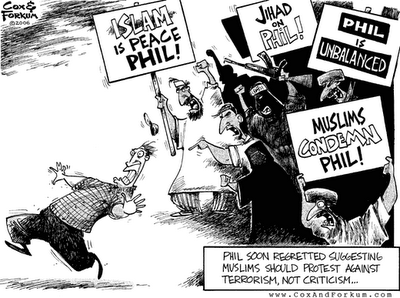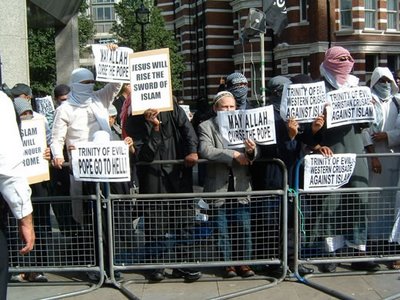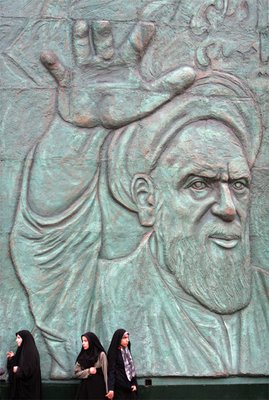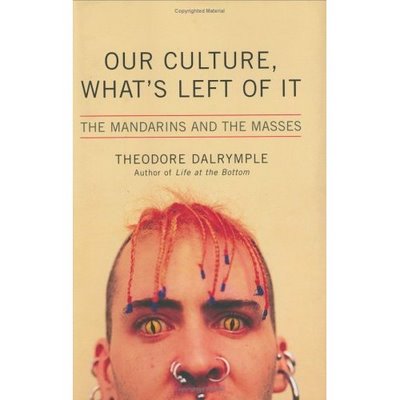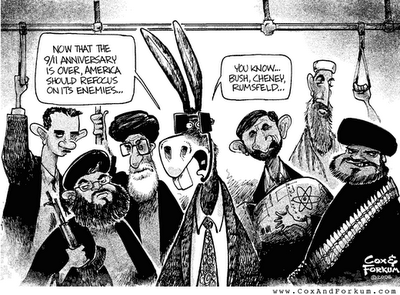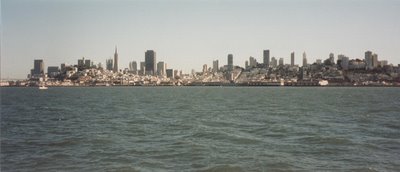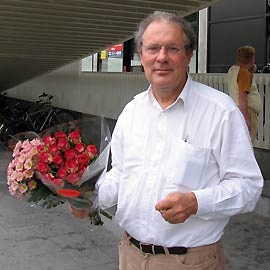 From Paul Belien at the Brussels Journal:
From Paul Belien at the Brussels Journal:Dalrymple on Decadence, Europe, America and Islam
Here is a portion of the introduction to the interview:
Anthony Daniels is a 57-year old recently retired psychiatrist. He began his career in Africa and worked for many years as a hospital and prison doctor in Birmingham before he moved to the South of France in 2005. Using the pen name Theodore Dalrymple he writes about the collapse of Western civilization in Europe, analyzing the social pathologies of our time. When he chose his pen name, he says, he opted for a name that would evoke the image of a severe and serious man. Though Daniels sets out to describe decadence, obviously not a cheerful topic, he himself is far from being a misanthrope. He is a “compassionate conservative,” The New York Sun wrote two years ago, “Stocky and balding, he has a wheezy laugh, a pugnacious mouth, and the devil-may-care smile of the born provocateur.” ...
The introduction goes on to outline the interview's contents, which cover a wide range of topics. Here are some excerpts from the interview:
Paul Belien: Mr Dalrymple, you are a well-known analyst of the cultural disease of our society. What do you see as the main problem?
Theodore Dalrymple: The underlying problem is a lack of purpose, a lack of feeling of belonging to anything larger than one’s own little life. This gives rise to quite a large amount of social pathology.
PB: Does this have to do with immigration? Does the problem lie mainly with second generation immigrants? Or do we find the same problem among our indigenous population, the young people, as well?
TD: I think it is our indigenous population which suffers from a lack of purpose. They have no religious belief. Quite a large proportion of the population does not derive any selfrespect from having to work for a living because some people are no better off if they work than if they do not work. They also have no cultural and intellectual interests. Therefore they do not feel they belong to any larger project than their private lives. [...]
After some discussion of the welfare state and it's effects in Western culture, the topic turns to the causes of loss of confidence in european culture:
PB: Where does this come from, this Western pathology of having lost trust, confidence in their own culture?
TD: I am not quite sure where it comes from. I think the Second World War must have played a very large part in it, because people feel that a culture that produced Auschwitz must have something deeply wrong with it and cannot be worth preserving.
PB: You could also say that it was the loss of culture in the West that actually produced Auschwitz?
TD: I personally would say that. The answer to a lack of civilization is not barbarism; the response to barbarism is not to destroy civilization. However, that has been the response of intellectuals in the West and, of course, this has had its effect on the population as a whole.
PB: You are also very familiar with the United States, where you have often been, and you write mainly for American publications [The City Journal, The New Criterion, National Review]. Is the pathology as bad there or is it less obvious?
TD: It is better in the United States. It is not that the pathology where it exists is not severe – and it is very severe in parts of America as well. The difference is that in America it has not entered the core of the population. There is more resistance to it. I think, and this is very important, that Americans still believe in their own country. Americans believe that they are part of a larger project – that is that of the United States. This can sometimes have bad as well as good effects, but it does actually keep the civilization together. I think the United States is more civilized than Europe now.
PB: Of course America was not involved in the atrocities of the second world war – Auschwitz and so forth – to the degree that the Western countries were. And the welfare state is not so big there as it is here.
TD: That is true. However, it is also true that Britain was not involved in the atrocities either. Yet the culture in Britain has probably fallen apart to a greater extent than in many other countries in Europe.
PB: So what is the reason for that? Why is Britain in such a bad situation, even worse than continental Europe? [...]
The role of religion and particularly Islam is discussed:
PB: What is your view? Is Islam inherently unstable?
TD: I personally think it probably is, because it does not have anybody to define the doctrine. There is no hierarchy in Islam.
PB: There is no Pope?
TD: There is no Pope, there is nothing to be laid down. A moderate person can always be outflanked by someone who claims to be more Islamic than he is. That is a very serious problem. Of course if you have a pope who himself is a theocrat, then that is a problem, too. But there are two things about Christianity which mark it out. The first thing is that it actually started out, and for quite a long time was, in opposition to a state and not itself a state. The second thing is that there has always been a theoretical divide between the Christian church and the state: the “render unto Caesar the things which are Caesar’s.” It has of course not always been in existence, but it has always been there in the doctrine as a potential space between church and state. And that does not exist in Islam. [...]

One aspect that was examined is the attempts by Muslim men at imposing Sharia law in Europe:
PB: How do you explain that when society has problems with Islam it is mainly with the young men and not with the young women?
RD: I think the young women are not strongly Islamist on the whole. In fact, many of them are very anti-Islamic, or would be if they had the opportunity. I also believe that the main interest of Islam for young men in Western countries is the predominance that it gives them over women. I will give you the reasons why I have come to that conclusion, and I accept that they are not scientifically foolproof. There could be arguments against them.
There are large numbers of Muslims in British prisons today. I have noticed that their behaviour is not that of religious persons. They are not interested in hallal meat, they are not interested in praying five times a day, they are not interested in keeping ramadan (except as a reason not to go to court), but they are very interested in preventing their sisters from going out with a boy of their own choosing. [...]
PB: You see many young Islamic women or girls wearing veils or the headscarves, nowadays, when they did not do so before.
TD: It is very difficult to assess how much comes from a desire to do so from the girls themselves and how much from pressure from outside. A dean of a medical school told me a very instructive story. Four Muslim medical students, women, suddenly started appearing dressed in the full veil. The college authorities did not want this to continue. They found an old law which goes back well before there were any Muslim immigrants in Britian, which says that any doctor or medical student who examines a patient must reveal his face to that patient. In other words no doctor is allowed to examine a patient with his face covered. So the girls, the medical students, were told that they either had to remove the veil or they had to leave medical school. They removed the veil and told the dean afterwards that they had never wanted to wear it in the first place, but had been intimidated into doing so by certain islamists at the university. It is inherently difficult to know what the meaning of the veil is, it is very difficult to find out whether people are doing it voluntarily or involuntarily because on a micro-level people are now living in a totalitarian climate.
PB: In our Western societies.
TD: Within our Western societies there is a micro-totalitarian climate and to ask people what they mean by it is very difficult. It is a bit like asking people in North Korea whether they like the government.
PB: Of course this totalitarian mentality is also affecting the original population, who are not allowed to raise certain topics anymore.
TD: I do not know whether they are not allowed to, but they feel hesitant to. Maybe it is worse in Belgium than in England. The problem of course with not speaking our mind is that if we do not speak our minds there is likely to be an explosion.

I suspect that fundamentalist Muslim men fear an explosion within their own families, if their women folk are encouraged to think for themselves and completely and openly speak their own minds, especially if they have been influenced by western values. Making them wear garment bags and beating and killing them is not a value that Western culture can ever embrace, nor should it try. Multiculturalism be damned.
I did an earlier post about what can happen to Islamic Women in Western countries if they try to reject Sharia and embrace their host countries customs. The post has a link in it to an excellent article from the German Magazine Der Spiegel, which covers the subject in depth. Too often, honor killings are the order of the day. It's heartbreaking.
How ANYONE who calls themselves a liberal can support Sharia law, directly or indirectly, is beyond me. To embrace liberalism and Sharia, you would have to keep parts of your mind divided from each other, and never let them talk. That what people in cults do. To me, it's like a kind of insanity, and it needs to be confronted. If political correctness and Multiculturalism get in the way of that, then they also need to be confronted.
Dalrymple has quite a few interesting things to say, it was hard to choose excerpts. I hope you will click on the link and read the whole interview. So much of what he says is observable all around us today.
Related Link:
You can find more Dalrymple links in the latter part of this post:
Political Correctness and Multiculturalism:
The New Tools of "Stealth" Socialism?




















